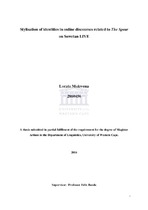| dc.description.abstract | This study focuses on a story featured on Sowetan LIVE, one of South Africa’s online newspapers. The flexibility of the mode in which the newspaper is produced, enables users to comment on its articles as they are published. The online newspaper was preferred due to its socio-political history and the huge South African audience it seems to attract. This study looks at one particular story which appeared on Sowetan LIVE and generated much interest in South Africa. The story is about a painting depicting President Jacob Zuma with his genitals exposed, termed The Spear by Brett Murray. This painting triggered a high volume of comments and engagement among South Africans on the Sowetan LIVE website, making it a valuable resource of online discourse. Therefore, this study explored comments in response to the two articles published on the Sowetan LIVE namely, “ANC takes battle of The Spear to court” and “Will Zuma’s spear stay up?” which when combined, ‘generated’ 1358 comments. This study particularly investigates the identities that emerged from the discourses found in the data and analyses the type of linguistic practices evident in the comments. In this regard, the main objective of the study is not only to determine how users style their social identities, but also their ‘linguistic’ ones during online interactions. In terms of social identities, the findings illustrate a distinction between traditional and modern identities ‘represented’ by Jacob Zuma and Brett Murray, respectively. However, although a distinction is evident, contradictions exist among the respective identities which feed back into the notion of identity as performative and fluid. In this way, the study reveals that the identities emanating from these discourses provide a glance at South Africa’s intricate identity ‘battle’, a ‘battle’ which is no longer solely based on race or collective identity, but more on the creation of new identities and perceptions based on traditional ones or a complete divorce of traditional identities. With regards to linguistic identity, the findings indicate that hybrid linguistic practices are a norm among the participants. This is because all participants employ netspeak features such as phonetic spellings, letter / number homophones and creative use of punctuation / capitalisation for emphasis or stress. Interestingly, although netspeak is evident from the findings common in online linguistic practices, this study has found that the use of such features is not random. This is so because participants tend to strategically fuse these features into the linguistic practices as a means to avoid censorship. This fusion and, ultimately, censorship avoidance strategies, rely on the re-purposing of semiotic resources. In this vein, the most used censorship avoidance strategies in the study are discussed and analysed in terms of context and the discourses that inform them. Furthermore, upon analysing the usernames and avatars selected by participants as part of identity construction, the findings demonstrate that these are used as an extension of the participants’ identities. From the findings of the study, it can be concluded that the South African youth’s identity and their perception of identity itself is in flux – ‘norms’ are constantly being re-invented. In essence, this study adds to an understanding of how historical material is re-purposed through an exploration of an online interactive feature that is posting of comments on an article of interest. It also contributes to an understanding of the hybrid nature of online linguistic practices. | en_US |

